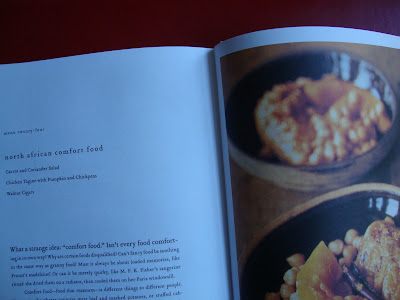Some of the best cooking can come out of adversity. It was the same kitchen where I made my first creme anglaise, scores of buttery yeast rolls, and more than one brilliant impromptu pasta dish. And all this out of an airless kitchen, with brick-orange walls. This is where I learned to make pie. Just me, Wagner, and my new cookbook: Pie, by Ken Haedrich.
I got it for Christmas, after asking for a specialized cookbook. There's something exhilarating about a whole book devoted to sauces, or chocolate, rice, noodles, apples, coffee... I received one that has 300 pie recipes. Three hundred. And so my pre-existing affection for pie turned into something much deeper and more lasting. ("Slice of Book Pie" indeed... Can you imagine what this blog would be about, if I'd gotten, say, 300 Tried-and-True Recipes for Sauerkraut? I might have been teaching polka steps, who could say?)
He's a brilliant teacher, too. Ken Haedrich, that is, not Wagner. (All I learned from Wagner was to always obey your father, and don't fall in love with the wrong person. Fine, as far as it goes, but you can't eat off of it.)
I devoured his introduction, that overview on the art of pie-making. Then I dashed out in the sleet to buy a pie pan and a rolling pin. And then we set to work. Three pies, one each weekend, came from that teeny oven, and I was hooked. Hooked. Like, love at first sight, daydreaming when I was supposed to be researching, planning more extravagant kitchen dates... I was in that kind of love. Still am, actually.
You can't see it so well in the picture, but my copy now bears all the honorable battle stains that a truly good cookbook should. There's caked-on pastry dough, stains from every kind of fruit and chocolate, oily smears, and crumbs of who-knows-what. Some pages are rippled with water damage, and the spine breaks in several places.
It's so well loved.
If you haven't made a pie before, you owe it to yourself to try. Really. Personally, I've never been much of a baker--churning out cookies and cakes and muffins and such? Doesn't really do it for me. But there's something different about making, and then eating, a pie.
If you start with Haedrich's All-Butter Pie Pastry, for instance, you'll see how pastries aren't so terrifying to make. This one rolls out like a dream, I promise. And as it spreads out over the flour, you can run your fingertips over the soft surface, admire the faint marbling of butter and flour, and then smell it, go ahead, take a deep breath.
That's what life's about, right there, and you haven't even gotten to the filling!
And what should it be? Wild Blueberry Lattice Top pie? Or the Apple-Pear White Wine pie? Maybe, to kick off autumn properly, the Caramel Apple-Pecan Pie, which just might make someone fall in love with you, not to mention pie, so go easy.
Or there's Banoffee, which will certainly change a life or two, or the Key Lime, or the Deep-Dish Blackberry Peach? The Shaker Lemon? Pear-Raspberry? All Strawberry? Maple Pumpkin? Grape and Fig? Or, if you're more daring than I am, the Spiced Parsnip, or the Avocado-Cream Cheese?
You make your filling, you swipe a taste, and then two. You take that perfect bottom crust and tuck it into the pie plate. (I love tucking in a crust. It seems I always hold my breath; I feel like I'm witnessing something important.) You spoon the filling over the pastry, smooth it out, and cover it with the top... it's as sweet as rocking a baby to sleep, I promise you.
And then it's in the oven--a normal-sized oven if you're lucky. You're passing by on tiptoes, peeking at it, watching the crust brown, breathing in deep, looking for the slow bubbling of juices on the edge... oh, it's heaven.
When it's done, a pie is a fleeting thing, at least in this household. Cakes, in my experience, can last forever--even the best ones. Not so with a pie. You seize the moment. You relish every bit. There is evening, there is morning, and the pie is gone. (And it was good.)
Like so many things, you learn by doing. For me, I learned that pies are about love. It's just that simple. If I'm making a pie, there is love involved. Love for the good work of creating one, and love for the people I share it with. I might make one on the spur of the moment, but never without a lot of heart.
My sister and her husband heard once that the average American eats six pieces of pie a year. (And then, my sister said, they looked at each other and basically said: Huh. Not in this family!) After I recovered from the shock, I decided I want to find these people, these under-privileged, under-pie-d people. Where are they? And can I help save them?
If, somehow, you are similarly undernourished, please do pick up this book. Don't be daunted by its size: that just means you're bound to like many of the recipes inside. And he's a fabulous teacher. Just be sure to let me know which ones you try.
Recommendation: If at all possible, read the first introductory chapter while sitting in a kitchen. Preferably a well-stocked kitchen, full of flour and butter and some good fruit. And have yourself a coffee. Then flip through the recipes, and when a pie chooses you, waste no time.
It could be your own beautiful beginning.























